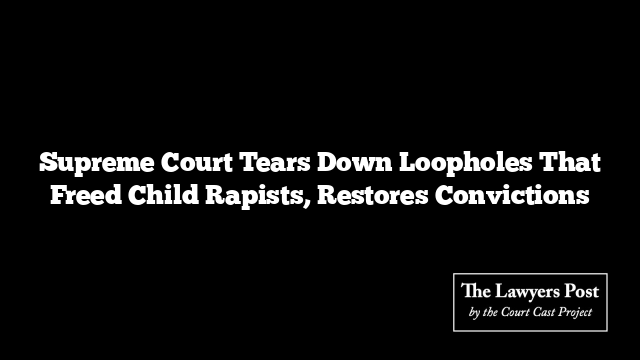The highest court of the land delivered a scathing rebuke to a justice system that lets predators walk free on technicalities. Restoring the convictions of two men who repeatedly raped a 12-year-old girl, the Supreme Court declared that minor procedural lapses cannot outweigh the unshaken truth of a victim’s testimony backed by medical evidence.
A Bench of Justices Sanjay Kumar and Satish Chandra Sharma overturned a Patna High Court ruling that had acquitted the men on grounds of inconsistent paperwork, errors in framing charges, and a joint trial under procedural law. The apex court called such reasoning a betrayal of justice.
“It is always a matter of utter failure for the system as a whole when a culprit, that too of a heinous sexual offence, manages to walk free by entangling the victim in misapplication of procedural rules,” the Bench warned.
The case dated back to 2016 in Bihar’s Bhojpur district, where the child was found three months pregnant after repeated assaults. Threatened into silence, she finally told her parents, leading to a trial court convicting both men and sentencing them to life in prison. The High Court, however, cast aside that conviction, prompting the victim’s father to seek intervention from the Supreme Court.
Rejecting the High Court’s approach, the justices stressed that minor discrepancies in documents or testimony are natural—particularly for victims from rural and marginalised backgrounds. Courts, they said, must not demand flawless evidence, as “perfection is often suggestive of tutoring and manufacturing.”
On the victim’s age, the Court found oral and documentary evidence consistently placing her between 12 and 15 years, none of which had been challenged during trial. Medical records and abortion documents further confirmed the assaults, demolishing the High Court’s doubts.
The ruling came with a larger message: technicalities cannot become escape hatches for sexual offenders. Trial courts, prosecutors, and appellate judges, the Supreme Court said, must remember that not every mistake is fatal to justice.
The judgment underscored how victims are wronged twice—first by their attackers, and then by a system that too often sacrifices truth at the altar of procedure.





